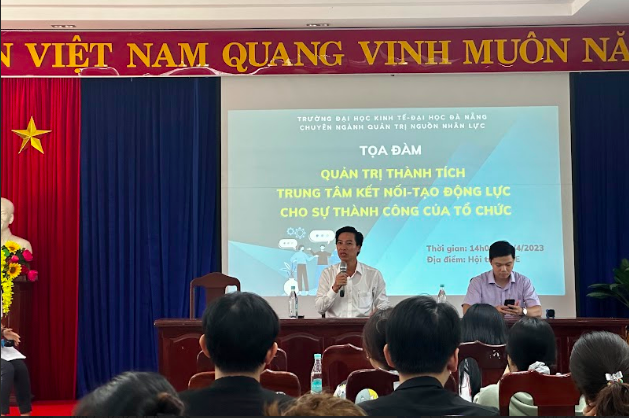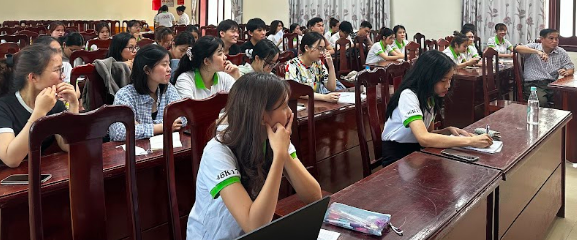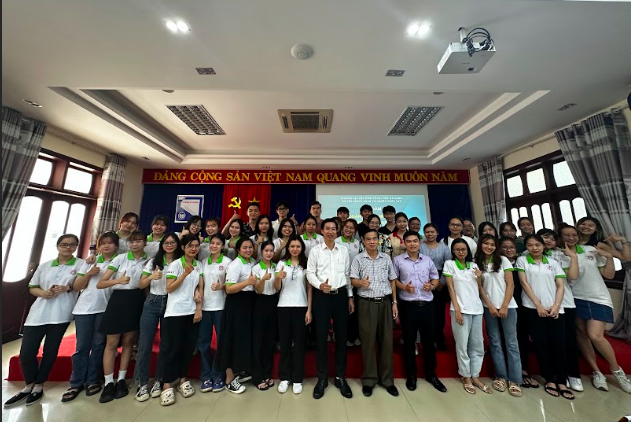SEMINAR "PERFORMANCE MANAGEMENT - A CENTER FOR CONNECTING AND MOTIVATING ORGANIZATIONAL SUCCESS
25/05/2023
On April 28th, the 46K student of the Human Resource Management major, in collaboration with Dr. Nguyen Quoc Tuan - Vice Dean of the Department of Business Administration at University of Economics - The University of Da Nang, organized a successful seminar titled "Performance Management - A Center for Connecting and Motivating Organizational Success," aimed at exchanging and addressing questions related to performance management in enterprises.

Photos. The guests of the talk show
The talk show was attended by over 80 students majoring in Human Resource Management at the University of Economics - University of Da Nang. They had the opportunity to share insights with Mr. Ngo Tan Nhi, the General Director of VITRACO Transport and Tourism Company, and Mr. Nguyen Ha Anh Vu, the Head of the Human Resources Department at F.C.L Joint Stock Company (operating in the field of hydroelectric power plant construction and electricity business), under the guidance of MC Gia Khanh.

Photo: Students showing interest in the sharing session of the guest speakers
Through the discussion, participants had a deeper understanding of performance management issues and how companies apply performance management in their operational management. The speakers also provided insightful answers to the concerns and challenges of the participants regarding performance management issues in practical business settings.
The Importance of Communication in Performance Management for Employees
With years of experience working and developing as a manager, Mr. Tan Nhi emphasized that performance management in a company is not a simple task and requires a significant amount of time to build a comprehensive system. Therefore, effective communication with employees plays a crucial role. Communication here refers to conveying the criteria and evaluation standards of the company, as well as the importance of performance evaluation throughout the organization.
According to Mr. Nhi, such communication helps employees not only understand the organization's goals and how their work is evaluated but also identifies the specific capabilities the organization expects them to improve and develop. This contributes to establishing a culture of achievement within the company. To achieve this, companies need to establish evaluation criteria that are clear, measurable, understandable, and self-evaluative for employees, ensuring fairness. These criteria should be communicated to the entire organization through the HR department and internal communications. Additionally, sharing sessions on vision and goals for each stage and training sessions on performance management for employees should be organized.
Furthermore, Mr. Vu also shared his insights on this issue, stating, "Our company tends to manage performance not based on Key Performance Indicators (KPIs) but rather based on Objectives Key Results (OKRs). Therefore, in the performance planning phase, each department's employees will discuss with each other, then with their department heads, and intermediate levels until the top management, who will determine the final standard.”
By involving employees in the process of setting performance targets through various stages, employees are committed to their work, and communication throughout the organization becomes easier, resulting in a more refined evaluation standard.
Establishing Evaluation Criteria and Addressing Subjective Evaluations
As Mr. Vu shared, with the afore mentioned process of setting performance targets, top-level managers must establish evaluation criteria through discussions with departments and lower-level employees to create a sense of participation without coercion. Additionally, since each department and position have different job responsibilities, nature, and expertise, it is necessary to have specific evaluation criteria for each specialized department and each level. It is important not to use a general standard for the entire organization due to time constraints.
Regarding subjective evaluations, Mr. Vu suggested that companies can apply a layered evaluation process, meaning that evaluations should go through multiple levels, with higher-level managers having direct exchanges with employees. To do this, a well-defined and widely disseminated process should be established from the beginning, combined with the use of evaluation software in the system to minimize disorder and time-consuming processes when going through multiple layers.
Agreeing with Mr. Vu, Mr. Nhi also affirmed the importance of building a performance-oriented culture within the organization. This includes providing feedback and recognition for employees' achievements, creating a transparent and fair performance evaluation system, and fostering a learning and development environment where employees can continuously improve their skills and contribute to the organization's success.
Overall, the seminar "Performance Management - A Center for Connecting and Motivating Organizational Success" provided valuable insights into performance management for the 46K students in the Human Resource Management specialization. The discussions and sharing sessions from the guest speakers and lecturers have equipped the students with knowledge and practical approaches to effectively manage performance in organizations.

Photos. Souvenirs Photos